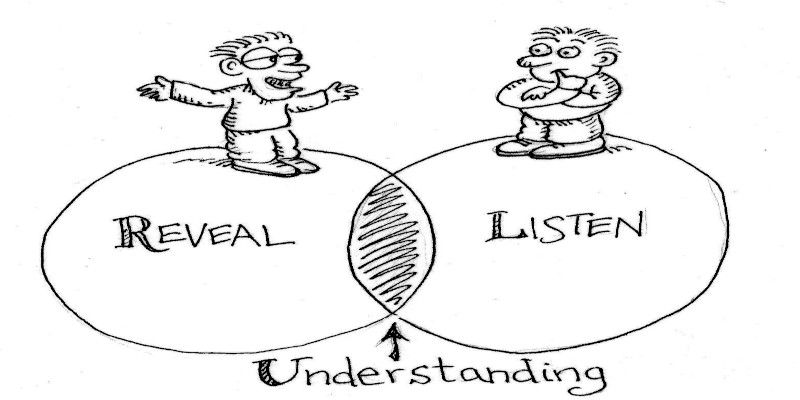Table of Contents
ToggleDo you know that dreaded feeling of intense anxiety, that can sometimes even turn into fear, when dealing with conflict?
Even though most fights are just verbal disagreements (luckily), they can still trigger our fight or flight response, an ancient remnant that heightens awareness, but greatly increases cortisol production, which is our stress hormone.
Therefore, it comes as no surprise that most people negatively associate the word conflict. Yet, confrontations can also be positive, such as for solving disagreements, for example.
That’s why we need to learn how to deal with confrontation the right way.
How to deal with confrontation in life?

The following list can help to teach you how to handle conflict effectively:
- Don’t wait
- Stand your ground
- What’s your goal? What are you looking to accomplish
- Plan appropriately if possible
- Prioritize what issues to solve
- Set boundaries
- Talk in person
- Show empathy
- Show respect
- Listen to the other person
- Remain calm
- Don’t take it personally
- Don’t get emotional
- Think before responding
- See it as a learning opportunity
- Speak slowly and confidently
- Don’t try to win the argument
Without further ado, let me explain each portion comprehensively.
Don’t wait

The single most important thing to do when learning how to deal with conflict is to not wait, and to take immediate action.
Solving the problem as quickly as humanly possible should be your main priority. This way, you’ll prevent the trouble from growing any larger than it has to be. As a consequence, the concern(s) is much easier to solve.
Most people wait far too long before attempting to resolve the concern. This is not surprising, seeing as most people greatly dislike conflict, since they think of it as being something bad, and attribute it negatively as a result.
Stand your ground
Most of us have probably heard of the fight or flight effect, and the stress hormone cortisol gets released when we’re in a highly stressful situation.
Unsurprisingly, conflict raises cortisol levels, and this puts us in a state of high alert.
Some people tend to fight, but a lot are also inclined to run away in an attempt to preserve oneself.
But running away doesn’t terminate the issue. It makes you more likely to run away again in the future. Because we nurture, grows. Not to mention that you can’t learn practical experience if you’re continuously running away from your problems.
Of course, there are exceptions to the rule. And sometimes, running away should be your number one priority. Think of dire circumstances such as people trying to rob, or fight you. Always run when your life is in potential danger.
What’s your goal? What are you looking to accomplish?

Why are you planning on engaging in the conflict?
Ideally, it’s to solve the conflict. But perhaps you’re engaging for less noble reasons, such as trying to win the argument, or because you want to rile up the other person.
I would advise folks to not engage in conflict when their primary goal is not to try to solve the issues at hand. Why? Because doing so will only lead to more difficulties and at an increased intensity.
Plan appropriately if possible
When you’re not put on the spot, it’s possible to plan and prepare yourself accordingly.
Visualizing is a great way to prepare yourself for the conflict at hand, and to run yourself through it mentally. Plan what you’re trying to say and accomplish, and also what you don’t want to do/say in the argument.
Think about what boundaries you want to set for what’s to come, so you don’t come off as a pushover.
Prioritize what issues to solve
Perhaps there are so many concerns to solve that you don’t know where to begin. If that’s the case, then I would recommend solving the most urgent one(s).
It’s typically better to focus on just one, or a few issues at once rather than trying to put a band-aid on all the present difficulties.
Because sooner or later, that band-aid will come off again, and the problem can be even larger than it was before.
Set boundaries

Another important step towards learning how to handle conflict is setting boundaries.
Just because there’s a conflict between two, or multiple people doesn’t mean that there’s no place for much-needed boundaries such as treating each other with respect, being honest, and listening to one another.
When folks show inappropriate behavior, or at least act in a manner that you deem unsuitable to a productive conversation, tell them. Be straightforward, yet respectful, and tactful.
You should remain rational and objective because being aggressive or overly emotional will do more harm than good.
Talk in person
Ever wondered why talking via text or email often leads to misunderstandings?
It’s because we can’t judge someone’s body language, and can’t hear the intonation of one’s voice.
Thus, we should always try to talk in person to solve the argument if possible. Oh, and make sure to talk one-on-one with the other person. We don’t want them to get defensive, or even worse, get the feeling that we’re trying to ridicule them.
Show empathy

Showing empathy is always important since we’re all human beings who experience strong emotions. As such, we aren’t always rational and are heavily influenced by our emotions and impulses.
But attempting to understand others, and trying to interpret the state of affairs from their point of view, will go a long way to humanize each other and to solve the problem at hand.
At the very least, you’ll gain a better understanding of each other, which will help to reduce tension.
Show respect
Respect is the foundation of good and long-lasting human relationships. Signs of respect include listening to each other, showing empathy, not yelling, and so on.
You should show respect to receive respect. Because why would another person respect you if you don’t return the favor?
Listen to the other person

Listening is a form of showing respect. Truly listening to each other without constantly trying to interrupt the other person in an attempt to get the spotlight is essential to come to an understanding of each other and to figure out the conflict.
Far too few people practice active listening skills. And it’s one of the most overlooked traits that can have a big positive impact, not just on your problem-solving efficiency, but also on your social life and career.
Remain calm
Remain calm and don’t start freaking out, even if the other individual is confrontational, or trying to rile you up.
When you get emotional, you’ve already lost. Don’t get angry, don’t cry, and maintain a healthy distance from the conflict. And when you do feel offended, remember not to take things too personally.
Don’t take it personally
People oftentimes make the mistake of taking things too personally.
When a person gets mad or has comments about our work or something similar, then we have a disposition to take the matter personally.
But the conflict, or sometimes anger, isn’t always directed at us, even when we take it this way. I think that modern-day folks take things way too personally, even when it wasn’t intended this way.
This is regularly because they’re unconfident, or because they seek attention.
Don’t get emotional
Don’t get emotional. Because our emotions aren’t rational, can be intense, impulsive, and when not controlled, destructive.
I’m not saying that you have to be a robot in the conversation, but remain level-headed instead of letting your emotions get the best of you.
Apply your logic, seek out the facts, and employ empirical evidence since this basically can’t be refuted through emotion.
Think before responding

Thinking before responding is a great general-purpose tip in life.
It will benefit you in all facets of your existence, most certainly when engaging in an argument with others.
Thinking before reacting gives you time to temper your emotions, and time to think about what you’re going to say. Both will aid you to engage in a positive, educational conflict.
See it as a learning opportunity
How do you deal with conflict positively and efficiently if you see it as a punishment rather than a learning opportunity?
Instead of seeing conflict as something detrimental and attributing it negatively, try seeing it as a learning experience, because it is.
We can only get better at practical knowledge through experience. And to get that vital experience, we must have the courage to engage in conflict.
Speak slowly and confidently

Speaking slowly and confidently, which can be measured by speaking at a slow, measured pace, not stuttering, not raising your vocal pitch, and so on, will help to portray an image of confidence, which is associated with strength.
Some people prey on the weaknesses of others because they see it as an opportunity to misuse those flaws for their benefit.
They might for example try to win the argument by getting aggressive, or by pushing your buttons.
Don’t try to win the argument
Engaging in conflict should be done to solve the problem(s), not just for the sake of winning the argument.
Trying to win the argument is a vanity problem. It only enhances the issues, and ultimately won’t make you a better person. All you’ve learned is how to misuse the circumstances to satisfy your pride.
How to handle confrontation with family?

Handling conflicts with family is always a tricky thing since we’re emotionally invested in the relatives we’ve come to love and know so well.
That’s on the button why you should try to distance yourself from the personal aspect of the conflict to get a rational, more objective picture of the situation.
Rarely has the conflict been solved through emotions. However, how we feel about the circumstances is essential as well.
My best tip would be to solve the issues as soon as you notice there’s a problem. Remain calm, show respect, and most importantly, don’t take it personally to not get offended.
How to deal with confrontation in a relationship?
Conflicts are part of life, and can, and should, be used to solve difficulties.
It’s no fun arguing with the person we’re in love with. But, even lovely couples have their struggles. Occasionally having a fight (not physically) and words, is something that I consider normal in even the best households.
Make sure not to make it personal by preventing yourself from making personal attacks that lead nowhere. Instead, try focusing on your main goal which should be solving the issue at hand.
Keep things respectful, listen to each other, and try to remain empathetic by looking at it from their point of view.
How to handle confrontation with friends?

Our true, best friends are those who tell you all the good things, but also the bad things, irrespectively if it may lead to conflict or not.
An important distinction between true friends and fake friends is that true friends do so out of love. They want the best for you. They want to see you become the best possible version of yourself, while fake friends will use it as an excuse to put you down for their own amusement.
The good thing is that your good friends are probably close to you. Thus, they know the real you, and will probably not take everything you say, no matter how silly or offensive it might seem, personally.
Again, be honest, straightforward, yet respectful.
How to deal with confrontation at work?
How to handle conflict in the workplace?
Dealing with confrontation at work is a tricky thing to manage effectively.
On the one hand, it’s not surprising that there will be issues since we don’t get to choose the people we have to work as a team with. As a consequence, some will suit you, while others won’t.
Nevertheless, you and your coworkers should be able to work together professionally without necessarily having to be friends. And that means you should at least be able to tolerate each other. Being friends with folks from work is optional since we’re there to work, and to earn money to provide for ourselves and our family in the first place.
Remain respectful, don’t make things personally, and set clear boundaries for future interactions. Even if the issue doesn’t get resolved, you should preferably still be able to work together professionally.
Ideally, though, the difficulties get settled since that will lead to a better working atmosphere, and a more productive team overall.
How to deal with confrontation with your boss?
Ah, yes. The dreaded disagreements with the boss. Most of us will know how anxiety-provoking these conversations can be. But sometimes, these talks are required to make a change for the better.
Whether it’s due to you not performing optimally, or because your boss is doing some things you’re not happy and excited about, let me explain how to handle the situation optimally.
I think it’s wrong to go into the conversation with a submissive attitude, even when it’s with a higher-up. Most people do so since they’re lower on the socioeconomic ladder, and since they’re dependent on their work/boss to pay their bills.
But if you do your work well, then you’re actually in a position of power, since most folks settle for mediocrity, and are looking to do the bare minimum in order not to get fired while still getting their paycheck.
Make sure that your boss knows what an advantage it is to have you working in their team, and what you’re doing that the rest of your peers do not. This way, they’ll typically come to realize that you’re an asset, and not someone to simply throw away lightly.
Be respectful, yet be goal-oriented. Try to resolve the concern, but set clear boundaries to prevent being seen as a pushover. Most individuals, especially bosses, actually respect someone who doesn’t let other people roll over them.
How to deal with confrontational employees?

I would say that it depends on the context, and how they’re approaching you.
If they’re respectful, and trying to engage in positive conflict, then I wouldn’t discourage that behavior. I would embrace, and even encourage it to engage in positive problem-solving behavior.
As I said, the context matters too. Were you at fault? Were you to blame? Are they trying to solve a problem that will benefit you, them, and the company?
Never forget that you’re working with people. And you should never lose touch with what your employees are going through, and what hardships they’re facing at work, and in their personal lives as well.
Try to approach them from a respectful, and empathetic position. Make it a point to see their point of view, to clear the air, and to resolve any conflict(s) that are present.
How to deal with confrontation with strangers?

Dealing with strangers is hard since we don’t know the person we’re interacting with. Are they friendly? Honest? Good-natured? Dangerous?
That’s why you should always be on guard when dealing with people you don’t know. Make sure to look at people’s body language to figure out whether you’re in a potentially dangerous situation or not.
That being said, don’t immediately assume the worst. Just because you don’t agree with someone you don’t know personally doesn’t mean they have bad intentions or don’t want to solve the matter respectfully.
Be honest, and respectful, but set clear boundaries to prevent yourself from looking weak. Because people with bad intentions pray on those whom they perceive as weak and unable to defend themselves.
The following link provides you with additional information about how to spot someone with bad intentions if you want to learn more about this topic. It’s vital to protect yourself!
Final note

Confrontation doesn’t have to be negative, as it can have positive results, and can be conducted respectfully. That’s why having arguments with others is not always unhealthy.
Yet, it isn’t fun. It’s often confrontational, direct, and straightforward, and emotions can flare up, which makes it something we typically avoid doing since it makes us uncomfortable.
But problems only get larger if we avoid them. That’s why we should solve them as soon as possible, to prevent those concerns from getting out of hand.
Call to action
Try to muster up the courage to engage in the conflict, which is the first step towards getting better at it, and solving any difficulties that arise in your life.
Practice the tips above to engage in positive conflict. The most important ones are practicing empathy, and being respectful, which includes active listening, remaining calm, and setting clear boundaries if necessary.








